Bereaved parents whose children were crushed to death in their classrooms during the earthquake in Sichuan province have turned mourning ceremonies into protest events in recent days, forcing officials to address a growing political backlash over shoddy construction of public schools.
Parents of the estimated 10,000 children who lost their lives in the quake have grown so enraged about collapsed schools that they have overcome their usual caution about confronting Communist Party officials. Many say they are especially upset that some schools for poor students crumbled into rubble even though government offices and more elite schools not far away survived the quake largely intact.
On Tuesday, an informal gathering of parents in Dujiangyan (都江堰) to commemorate their children gave way to unbridled fury. One of the fathers in attendance, a quarry worker named Liu Lifu, grabbed the microphone and began calling for justice. His 15-year-old daughter, Liu Li, had died along with her entire class during a biology lesson.
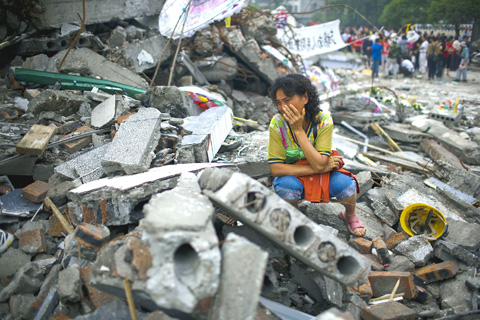
PHOTO: NY TIMES NEWS SERVICE
“We demand that the government severely punish the killers who caused the collapse of the school building,” he shouted. “Please, everyone sign the petition so we can find out the truth.”
The crowd grew more agitated. Some parents said that local officials had known for years that the school was unsafe but refused to take action. Others recalled that two hours passed before rescue workers showed up; even then, they stopped working at 10pm the night of the earthquake and did not resume the search until 9am the next day.
In the end more than 200 bodies were recovered from the school. “The people responsible for this should be brought here and have a bullet put in their head,” said Luo Guanmin, a farmer who was cradling a photo of her 16-year-old daughter, Luo Dan.
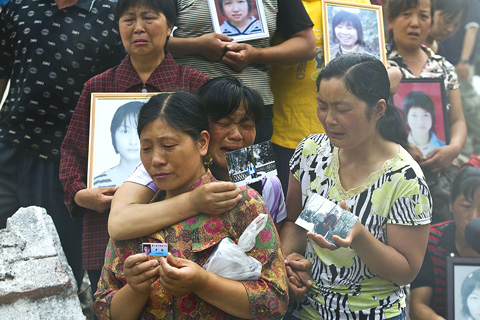
PHOTO: NY TIMES NEWS SERVICE
Sharp confrontations between protesters and officials began over the weekend in several towns in northern Sichuan. Hundreds of parents whose children died at the Fuxin No. 2 Primary School in the city of Mianzhu staged an impromptu rally on Saturday. They surrounded one female official who tried to assure them that their complaints were being taken seriously, screaming and yelling in her face until she fainted.
The next day, the Communist Party’s top official in Mianzhu (綿竹) came out to talk with the parents and stop them from marching to Chengdu, the largest city in the region, where they sought to prevail on higher level authorities to investigate. The local party boss, Jiang Guohua, dropped to his knees and pleaded with them to abandon the protest, but the parents shouted in his face and continued their march.
The protests threaten to undermine the government’s attempts to promote its response to the quake as effective and to highlight heroic rescue efforts by the People’s Liberation Army, which has dispatched 150,000 soldiers to the region. Censors have blocked detailed reporting of the schools controversy from the state-run media, but a photo of Jiang kneeling before protesters has become a sensation on some Web forums, bringing national attention to the incident.
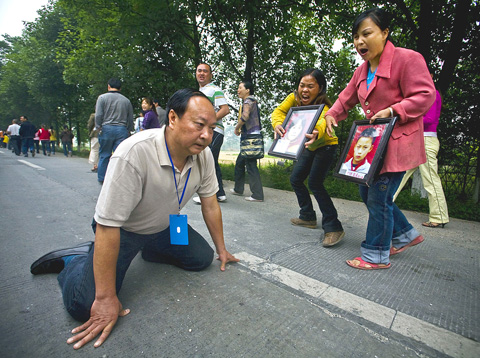
PHOTO: NY TIMES NEWS SERVICE
One of China’s boldest magazines, the business journal Caijing (財經), used its main commentary article in its latest issue to call on the government to step up investigations of shoddy school construction. Xinhua, the official news agency, also issued a commentary saying a speedy official response is warranted.
The authorities in Beijing appear to recognize the delicacy of the issue. On Monday, a spokesman for the Education Ministry, Wang Xuming, promised a reassessment of school buildings in quake zones, adding that those responsible for cutting corners on school construction would be “severely punished.”
Local officials across Sichuan have also bowed to the pressure.
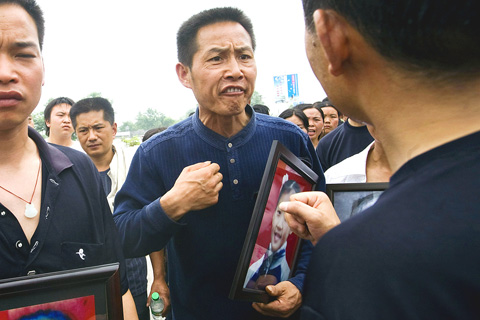
PHOTO: NY TIMES NEWS SERVICE
In Beichuan (北川), officials announced an investigation into the collapse of a middle school there that killed 1,300 children. Reached by phone on Tuesday, two provincial officials in Chengdu vowed a vigorous response, although they suggested that full-scale investigations should take a backseat to the needs of survivors.
“We are not officially investigating the quality problems in school buildings, but we definitely will, after we finish the temporary lodging for refugees,” said Tian Liya, the party secretary of the Sichuan Construction Bureau’s emergency department.
Gauging from the outbursts of recent days, any delay will only embolden infuriated parents. In their confrontation with Communist Party officials last Saturday, the parents encircled the vice secretary of the Mianzhu city government and called her a liar for her report on the destruction of the Fuxin school that failed to mention that 127 students had been killed.
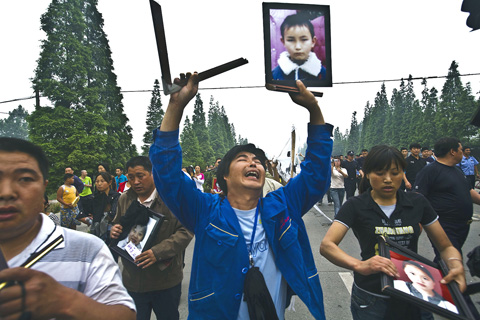
PHOTO: NY TIMES NEWS SERVICE
“Why can’t you do the right things for us?” they shouted. “Why do you cheat us?” For the next 20 minutes they yelled and screamed in her face until she passed out and had to be carried away by an aide.
The next day, the parents directed their ire at Jiang. When his answers proved unsatisfying, they began their march to Chengdu. Jiang dropped to the ground several times and begged them to stop. “Please believe the Mianzhu Party committee can resolve the issue,” he said. They kept walking.
Three hours later, the police tried to intervene. During the ensuing struggle, the broken glass from the pictures of dead children left several parents bleeding. After a tense standoff, the marchers agreed to board government buses that brought them to Deyang, the county seat. There, they met with the vice mayor, who promised he would start an investigation the following day.
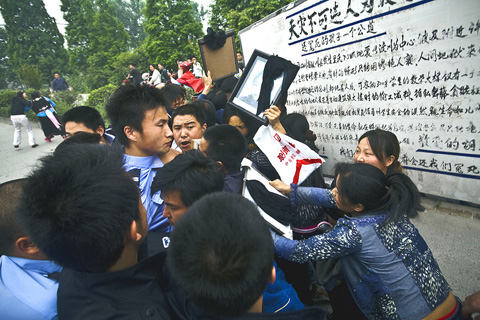
PHOTO: NY TIMES NEWS SERVICE
“I hope you can be free from this mood of sadness,” Zhang Jinming, the vice mayor, said before sending them away. “The government will make a research team and give you a satisfying result.”
The parents who lost their children at Juyuan Middle School say they have yet to hear from Dujiangyan officials. A few parents said they had been approached by teachers and told they would be well-compensated for their loss — about US$4,500 per child — if they would stop their increasingly vociferous public campaign.
“We don’t want their money, we just want this corruption to end,” said Luo, the farmer, as others nodded in agreement. Many parents said they felt insulted that no one from the school or the government had come to offer their condolences.
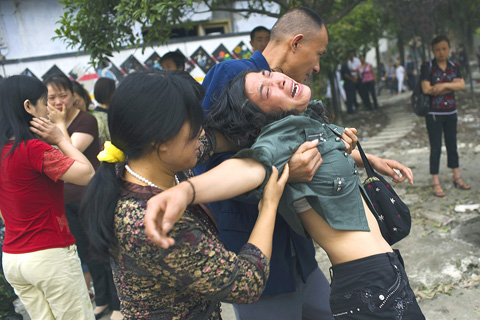
PHOTO: NY TIMES NEWS SERVICE
The only official presence at Tuesday’s gathering in Dujiangyan was a pair of tanker trucks full of disinfectant, which arrived just at the start of the ceremony. As the parents began lighting candles and incense, a worker directed his hose at the mountain of rubble. The strong smell of bleach drifted over the crowd. Then, perhaps sensing the potential for confrontation, the workers drove away.
The parents were told to group themselves according to their children’s classes, and as they lined up they numbly exchanged stories of loss. “When they pulled my boy out he kept begging for water but then he died,” said Wang Chaoping, holding a passport-sized photo of his 16-year-son, Wang Tinghai. “He wasn’t the best student, but he loved sports.”
Some parents came hugging framed photographs and dogeared achievement awards, placing them on the spot where their sons and daughters died under heaps of broken concrete. The men set off fireworks to chase away evil spirits as wads of paper money smoldered amid the rubble.
Then a dirge began playing over the loudspeaker, and all at once the women doubled over in agony, a chorus of 100 mothers wailing over the loss of an only child. The husbands wept in silence, paralyzed by the storm of emotion.
“We worked so hard to raise you, and then you left us so suddenly,” a woman screamed, pounding the ruins of the Juyuan Middle School with her fists. “How could you leave us to grow old alone?”
The parents whose children attended Juyuan were mostly farmers and factory workers, and the harshness of their lives, and their loss, was etched in their faces. Many, like Li Ping, 43, said they had lived frugally in order to pay obligatory fees for meals and a bed in the dormitory, which withstood the quake with nary a crack.
“I put all my hope in my one child,” said Li, who has been unable to work because of chronic liver disease. “They were supposed to support us in old age.” He started to well up but then stopped himself. “We’re not asking the government for money,” he said. “We just want them to tell us why they died.”

On April 26, The Lancet published a letter from two doctors at Taichung-based China Medical University Hospital (CMUH) warning that “Taiwan’s Health Care System is on the Brink of Collapse.” The authors said that “Years of policy inaction and mismanagement of resources have led to the National Health Insurance system operating under unsustainable conditions.” The pushback was immediate. Errors in the paper were quickly identified and publicized, to discredit the authors (the hospital apologized). CNA reported that CMUH said the letter described Taiwan in 2021 as having 62 nurses per 10,000 people, when the correct number was 78 nurses per 10,000

As we live longer, our risk of cognitive impairment is increasing. How can we delay the onset of symptoms? Do we have to give up every indulgence or can small changes make a difference? We asked neurologists for tips on how to keep our brains healthy for life. TAKE CARE OF YOUR HEALTH “All of the sensible things that apply to bodily health apply to brain health,” says Suzanne O’Sullivan, a consultant in neurology at the National Hospital for Neurology and Neurosurgery in London, and the author of The Age of Diagnosis. “When you’re 20, you can get away with absolute

May 5 to May 11 What started out as friction between Taiwanese students at Taichung First High School and a Japanese head cook escalated dramatically over the first two weeks of May 1927. It began on April 30 when the cook’s wife knew that lotus starch used in that night’s dinner had rat feces in it, but failed to inform staff until the meal was already prepared. The students believed that her silence was intentional, and filed a complaint. The school’s Japanese administrators sided with the cook’s family, dismissing the students as troublemakers and clamping down on their freedoms — with

As Donald Trump’s executive order in March led to the shuttering of Voice of America (VOA) — the global broadcaster whose roots date back to the fight against Nazi propaganda — he quickly attracted support from figures not used to aligning themselves with any US administration. Trump had ordered the US Agency for Global Media, the federal agency that funds VOA and other groups promoting independent journalism overseas, to be “eliminated to the maximum extent consistent with applicable law.” The decision suddenly halted programming in 49 languages to more than 425 million people. In Moscow, Margarita Simonyan, the hardline editor-in-chief of the